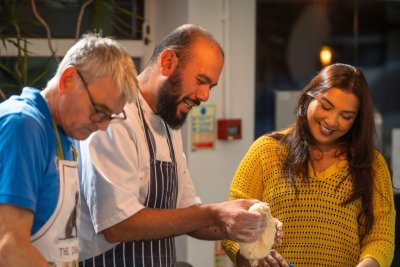Sustain / Real Bread Campaign / Articles
Ambassador profile: Giovanni Di Sarno
The fourth-generation, Italian baker shares his thoughts and memories.

I am a baker, born and bred. My grandmother was a baker, as was my great-grandmother before her. My father and aunt are still bakers, though now nearing retirement after years of sleepless nights making Real Bread for their local community of Pollena Trocchia in the region of Campania, near Naples.
I spent more of my childhood and adolescence in our family’s bakery than at home. Since I was old enough, there was always something to do, so I used to work at the bakery in the afternoon after school and in my spare time. It's a family tradition I’m proud to continue. Obviously I don’t make ‘standard’ bread; I make nutritious, genuine sourdough bread, without artificial preservatives or other additives, baked in a wood-fired oven.
Crazy in loaf
Speaking about our family’s bread, we have always concentrated on the fact that we make it with love. Given the enormous amount of hard work and dedication required every day, surely a person who dedicates their entire life to creating good-quality, Real Bread for their community must be either in love with what they do or crazy. After all, we are willing to do crazy things for love, right? Well, this has been the spirit that we have passed from generation to generation in our family, at least. It’s an obsessive love for our job and for the bread that we make!
That’s not to say my career in the family bakery was always easy or enjoyable. Sometimes it was difficult. One autumn afternoon when I was about 14, I was playing football in the courtyard in front of the bakery with my cousins. Maria, my grandmother, started shouting my name from inside and, scared to see what was happening, I immediately ran to her. She was fine but wanted me to help wheel trolleys of dough into the fridge to be retarded until it was time to bake, early the next morning. Annoyed, I replied that I didn't want to help because I better things to do: playing football. Without warning, my grandmother grabbed my ear and pulled it so hard that I still feel the pain when I think about it 20 years later. She told me: "You're not going anywhere, you've reached the age to help and now you're coming with me to check the dough."
At that time, I helped reluctantly. Today I am eternally grateful to my grandmother and my parents who, with perseverance and determination (though sometimes with severity), passed on to me the skills, knowledge, love and passion for my job.
Changing appetites
In the past, bread was the main meal for many people in Italy. Families first thought of buying bread and then planned what they would prepare to accompany it; perhaps soup, stew, pasta (with lots of sauce to dip bread into), or simply cheese and salami. Until about 30 years ago, the loaves my family’s bakery made weighed 2kg each. They were known as ‘ruote del carro’ (wagon wheels) on account of their shape and size.
Over the years, however, something has changed in the consumption of bread in Italy and the size of the loaves made at our family’s bakery changed accordingly. First they reduced to 1.2kg and then to 800g. Now, sadly, most of the loaves made on weekdays weigh only 600g and the bakery only sells 1kg loaves on Sundays, when families gather together.
The price of progress
Since World War II, we have learned to produce food faster and in larger quantities. Despite what industry and supermarkets say, the changes aren’t all ‘what consumers want.’ In the case of baking, loaves being soft and lasting longer might be to some people’s liking but when did anyone ever ask for poor quality ingredients and lots of additives?
Day after day, low prices and expensive marketing campaigns have brainwashed people. They forget, or never knew, what good bread is. What are the hidden costs of this ‘progress’? Are people poisoning themselves with cheap and unhealthy imitations of bread? Do people really believe that good bread can be made in a short time, without effort?
Buying cheap loaves from large supermarkets helps to force more and more small, independent bakeries to close. At the same time, the number of people apparently intolerant, or even allergic, to gluten seems to increase every year. Self-proclaimed ‘experts’ also declare on social media: ‘carbohydrates are bad for your health!’ and people reduce or remove bread from their diet, instead turning to Ultra Processed Foods as if they were healthier than bread.
My mission
Driven by the desire to learn more, I left the family bakery at the age of 22, since when I have visited and baked in countries including Australia, New Zealand, Sweden, Germany and the UK. For the past eight years, I have lived in England, where I teach sourdough Real Bread making in schools, bakeries, community clubs, village halls and at private events. I share the importance of making bread with only four ingredients: good quality flour, water, salt and a lot of determination.
My job – my duty - is to share my knowledge and passion, reminding people who have forgotten what it means to make and believe in good quality bread, and to support small, independent bakeries that make genuine sourdough. Above all, my mission is to teach new generations how important it is to choose the right ingredients and the correct way to make good-quality Real Bread.
Originally published in True Loaf magazine issue 58, April 2024, before Giovanni volunteered to become a Real Bread Campaign ambassador.
Want people to read your words here?
If you fancy writing a Real Bread related article about yourself (or someone else) step this way...
Published Monday 21 October 2024
Real Bread Campaign: Finding and sharing ways to make bread better for us, our communities and planet.

